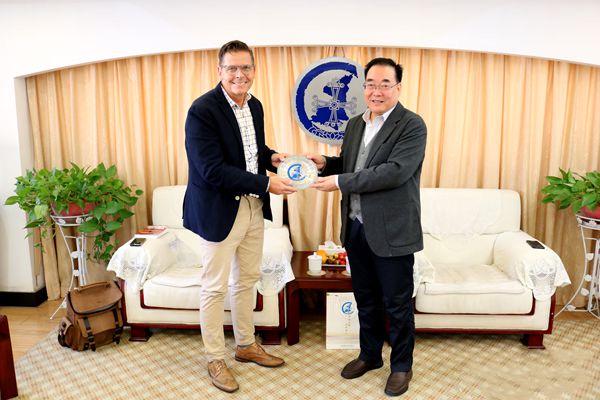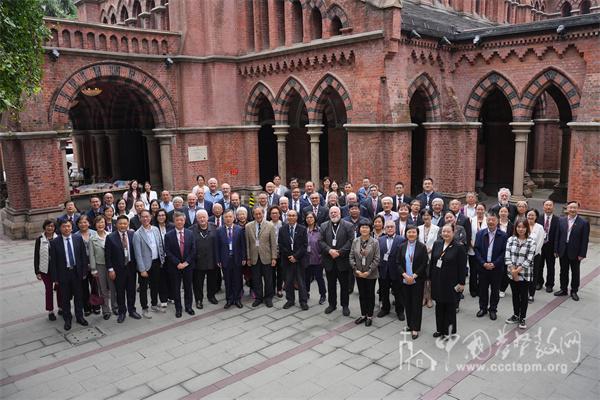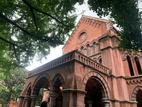Erik Bürklin, president of China Partner (CP) and descendant of German missionaries to China, recalled his October trip to China, which marked a milestone in fostering international church connections and strengthening ties with China’s Christian community.
Following a prior visit in May, Bürklin and his team traveled to Shanghai, Nanjing, Beijing, Xi’an, and Chongqing in October.
Last year, during his first trip to China since the COVID-19 pandemic, Bürklin met with Rev. Wu Wei, president of the China Christian Council (CCC). During their meeting, he suggested convening a symposium gathering with international church leaders. Rev. Wu liked that idea, which materialized as the China-U.S. Christian Fellowship in Shanghai from October 15–16, 2024.
The fellowship gathered around 37 people from about ten ministries outside of China's mainland, primarily from the United States, along with representatives from Canada, Singapore and Hong Kong.
Bürklin described the event as a “great gathering,” noting that its original name, “China Church Symposium,” was changed to “China-U.S. Christian Fellowship.” He appreciated the shift, saying it emphasized “fellowshipping together as Christian brothers and sisters.”
The event featured fewer formalities and more opportunities for prayer, hymn singing, and shared meals. “That’s exactly what we wanted,” he added.
He explained the purpose of the international side, “As an international group, we wanted to show our solidarity with them [China’s Christians]: we stand with you, we’re praying with you, and we want to serve you.”
Numerous CCC&TSPM leaders attended, providing updates on their current circumstances amid increased restrictions from the National Religious Affairs Administration (NRAA). “There was no complaining. They were rather explaining the current situation and what they’re doing about it.” Bürklin explained, “It's typical Chinese church culture that when there're challenges, they just figure out a way to do it differently.”
The Chinese side shared not only God’s work in COVID and post-COVID but also the future vision. Plans are already underway for a follow-up symposium in Los Angeles in 2025 to further connect church leaders from China and the U.S.
“We are supposed to use this symposium as a way to explain to the Western world what God is truly doing inside of China.” He said, “The next step is to find out, as foreigners do with Chinese church leadership in the midst of this current climate that they’re dealing with.”
After the symposium, the delegation visited the Nanjing Union Theological Seminary, where they learned that apart from this national seminary, there are 14 regional seminaries in China, with local Bible schools under them and more than one hundred Bible training centers, run by local churches for their workers and lay pastors.
Another visit to the Amity Printing Company, the world’s largest Bible publisher which has printed over 270 million Bibles since 1987, startled a CP board member from Germany. “Most people don’t know that the company provides Bibles for Christians within China and also for around the world.” Before COVID, he once noticed the Gideon Bible was being printed there in English. Spanish Bibles were also printed. “They print Bibles which have been translated into seven minority languages.”
“It’s phenomenal what God has done over the 27 years through Amity Printing Company,” he said.
The United Bible Societies China Partnership (UBS CP) director, Dr. Bernard Low from Singapore, was among the visitors. Providing the paper, UBS CP partners with Amity closely. “They have developed a special super thin paper.”
In a Beijing strategic meeting with the director of NRAA, Bürklin shared how CP started in China and his identity as a third-generation Christian minister in this country. “It’s been one of our main values to have good relationships with government leadership.”
Founded in 1989 by his late father Dr. Werner Bürklin, who was born in China as the son of German missionaries with the China Inland Mission, the organization was first named Werner Bürklin Ministries and later renamed China Partner in 1999. China Partner’s mission is serving the church in China, through training, distributing Christian literature, and fostering meaningful connections.
In Xi’an, China’s northwestern Shaanxi Province, they received “a fun surprise” — unexpectedly invited to conduct a three-hour training seminar for students at Shaanxi Bible School. A couple from the team delivered one on marriage.
In Chongqing, they visited the recently renovated Bible School, which currently enrolls 25 students but aims to expand to 100. Bürklin admired the school’s forward-looking vision, “There’s going to be an increasing need to equip more pastors and lay leaders.”
The lead pastor of a downtown church in Chongqing told him that the church baptized 100 believers in 2023. It seems that church growth has slowed down over the last decade, but “they continue to stay faithful to the call of preaching the gospel, having people come to faith, and baptizing them.”
To his surprise, the pastor was trained as a student at Sichuan Theological Seminary by an international team brought by Bürklin’s father, Dr. Werner Bürklin, in 1996. Then the pastor graduated, went to Nanjing for further education, and became the senior pastor of one of the largest churches in Chongqing.
“That was a huge blessing to see how our investment over the years in the next generation of church leaders and pastors is coming to full fruition.” Bürklin reflected, “Thirty-five years ago, these kids were in their twenties and thirties. Now they, in their fifties and sixties, and have become key leaders all throughout China.”
In 2025, China Partner will celebrate the 100th anniversary of Bürklin’s grandparents’ missionary service in China, with a commemorative event in Germany, his original home. Meanwhile, the organization has received invitations to return to China, with plans to visit cities like Shanghai, Guangzhou, Shenzhen, Jieyang, Wuhan, and Nanchang.
In regards to how to reach young people, he suggested creative approaches like music and distributing tracts. “Young people need to learn the beautiful, good news of the gospel.”
As he observed an exodus of young families from China in recent years, Bürklin urged the nation’s churches to instill hope in the younger generation. “If the church leadership can figure out a way to give them hope for the future, then they will then be motivated to work, take care of their parents, and all these things.”













